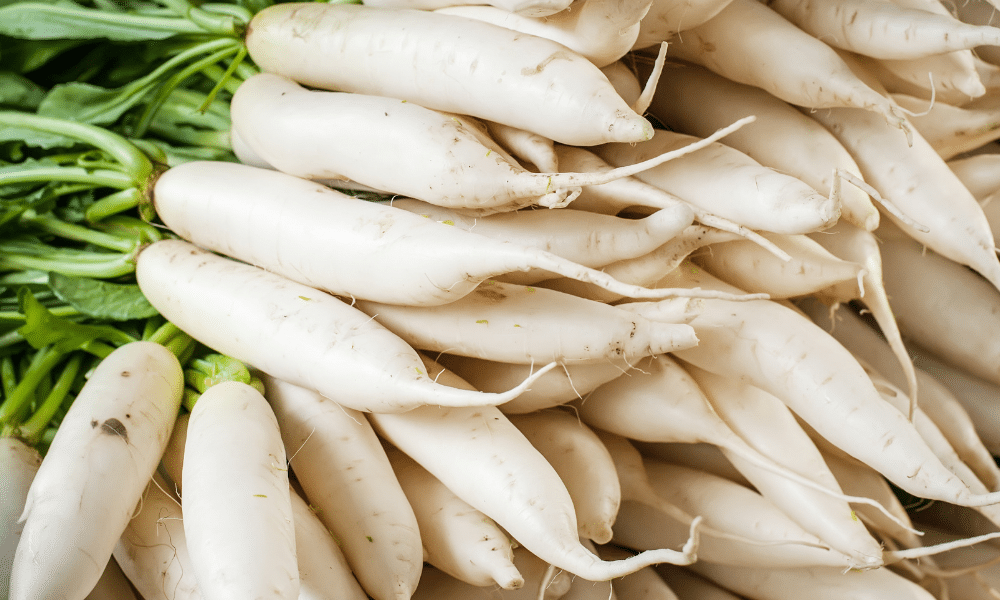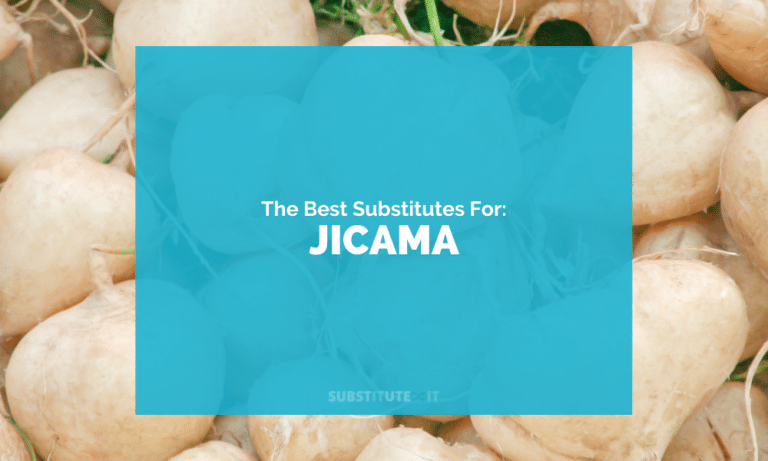You have probably never heard of jicama before unless you are a big fan of Mexican cuisine. It is not a common vegetable, but worth a try nonetheless!
Jicama is a root vegetable and is the only edible part of its plant. The leaves and everything else are toxic and entirely inedible.
Outside of Mexico, jicama is hard to get your hands on. It can sometimes be found in speciality markets, but if you cannot find a good jicama supplier, what can you use instead?
Our 4 Substitutes for Jicama
Jicama has the starchy sweetness you would typically expect of a root vegetable. However, it is set apart by its slightly nutty undertones.
You can eat jicama both raw and cooked. When raw, jicama is very crunchy, but the longer it is cooked, the softer it becomes.
Here are our top 4 substitutes for jicama:
1) Water Chestnuts
When people describe the taste of jicama, water chestnut is the go-to comparison.
Though they are not a root vegetable like jicama, water chestnuts have a delicious sweet and bitter balance to them that is very close to that of jicama. The main flavour difference is that water chestnuts tend to be sweeter no matter how they are prepared.
This can be easily balanced out with an extra bit of bitterness, such as a squeeze of lemon juice. Or, if you prefer, some extra salt.
Water chestnuts will stay crunchy when cooked and will not soften to the same extent as jicama. They are better suited as a side dish or garnish than they are as a base of a meal.
Stick to Fresh
You can eat water chestnuts when they are raw, but only when they are fresh. Canned water chestnuts will upset your stomach if eaten uncooked due to their preservatives.

2) Jerusalem Artichokes
Also known as earth apples or sun roots, Jerusalem artichokes are not the same as your usual artichoke. They are related, but Jerusalem artichokes are the root of a kind of sunflower, which gives it different qualities from the common artichoke.
While this difference makes Jerusalem artichokes a bad substitute for common artichokes, it makes them a great replacement for jicama.
Jerusalem artichoke lacks the same kind of jicama sweetness, but it does emphasize its nuttiness.
When raw, Jerusalem artichokes have the same crunch as jicama. They soften up easily enough as they are cooked, taking on the same consistency as potatoes.
Though they have a higher fibre content than jicama so will be a little chewier.
Add Sweetness
To make up for the lack of sweetness of Jerusalem artichokes, add a drizzle of honey before adding them to your dish.

3) Turnip
Considering that jicama is often called the Mexican turnip, it only makes sense that regular turnip is a great substitute for most recipes.
Another kind of root vegetable, turnip is used across many cuisines and is widely available all year round. Though the best time to buy them is the colder months.
Turnips are known for being one of the sweeter root vegetables and have a slight bitterness. This helps make your dish more complex and elevate the main focus of your dish, such as the meat.
Like jicama, turnip will get softer the longer it is cooked though it isn’t enjoyable to eat raw in the same way jicama is. So even if you cook it for a few moments, it will make it taste a lot better.
Choose the Right Turnips
There are many types of turnips that come in a range of colours. To replicate the look of jicama, use a white turnip. They are the variety that tends to be on the sweeter side.

4) Daikon Radish
There are lots of radish varieties out there, but daikon radish (aka white radish) is among the sweeter kind. This makes it the best kind of radish to use as a jicama substitute.
Daikon radish does look different to jicama, being entirely white and long rather than having a brown peel and round. However, they are a very similar texture.
When cooked, daikon radish takes on the consistency of a carrot which is harder than that of jicama. But when raw, daikon radish gives the perfect crunch like jicama.
It is a much juicer food than jicama, which is something to account for when adding to your own dish.
Know the Health Benefits
Jicama is favoured for its vast amount of antitoxins. Daikon radish is very much the same. They are a very low-calorie food and can help prevent heart disease in the same way that jicama can.

Other Substitutes for Jicama
Many of the substitutes listed above can be harder to find for a reasonable price, depending on the time of year and where you live. Here are a few more substitutes that are cheaper and easier to find:
- Red Radish – It may be smaller, but red radish works in the same way as daikon radish. The main difference is the heated kick of red radish.
- Green Apple – Sweeter and starchier than other apples, green apple will give you a jicama crisp when raw and soften up as it is cooked.
- Parsnip – Another root vegetable, parsnip will work like a turnip but is more earthy and firmer than other root vegetables.
Summary
Finding jicama in the UK is hard, but as a root vegetable, it is easy to replace in a dish and to find substitutes for jicama, fortunately. Some other root vegetables like turnip will replicate its texture while other vegetables like water chestnuts can provide close jicama flavour.
